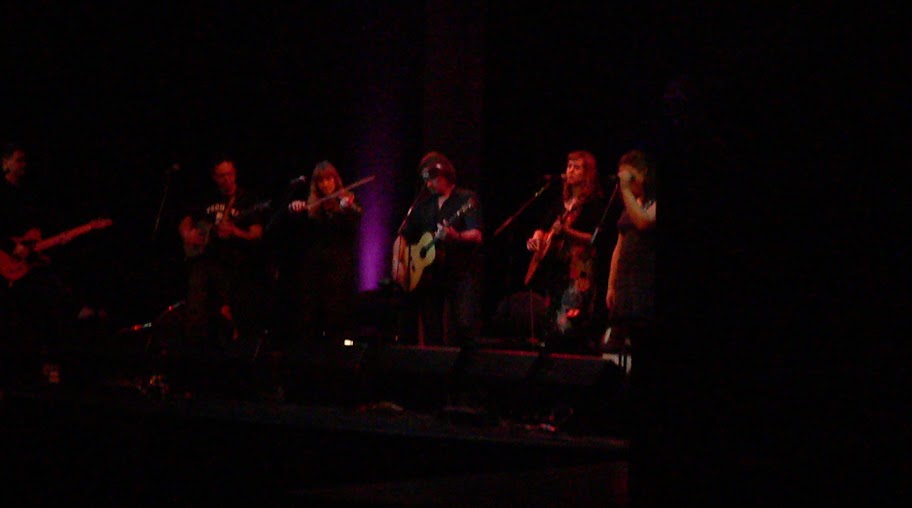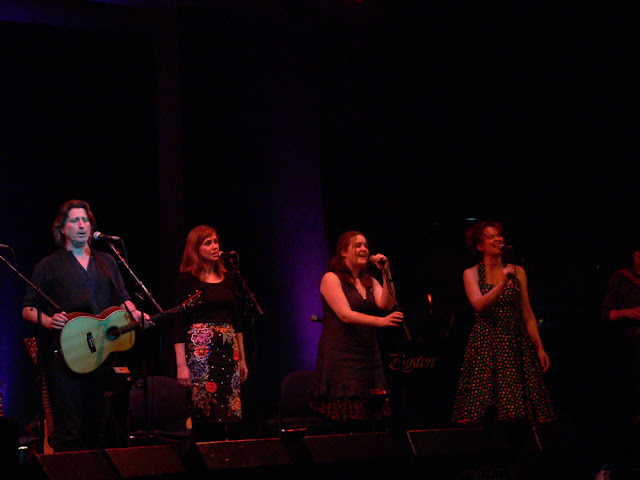Eight musicians,with different backgrounds and approaches, hailing from various locations in England, Scotland, Canada, and the United States. Six days in spring. A rambling old farm house in Shropshire in the south of England. They come together because they are set the task to come up with an evening’s worth of song which they will perform at a sold out concert on the sixth day, and which will be recorded for an album and a dvd. The focus of the music they will create? It all had to resonate in some way with the life and work of Cecil Sharp.

Cecil who, you ask? In the early part of the twentieth century, Sharp, an Englishman, traveled the hills and hollers of Appalachia, following his fascination with folk songs that had fallen out of knowledge in most of England but had lived on in many vibrant versions in remote regions of the American south. Barbara Allen, The Gypsy Laddie, Every Night When the Sun Goes In, The Cuckoo, The Foggy Dew -- songs that became the backbone of much of the music of America, from the blues to jazz to country to bluegrass, were what Sharp and his assistant Maud Karpeles heard and wrote down in days before modern technology.
Steve Knightley, Jackie Oates, Andy Cutting, Caroline Herring, Jim Moray, Patsy Reid, Leonard Podolak, and Kathryn Roberts found the music Sharp and Karpeles collected and the ideas of gathering and handing on song and story fertile ground for their imaginations. Sharp’s diaries were being readied for publication as the project progressed, and the musicians were given access to this material, which added fuel to the musical fire.
Eighteen songs were the result, performed at that concert at that concert at the end of the project week, and later on tour. They range from the serious to the funny, from instrumental to intricate storytelling, from pieces which evoke the era in which Sharp traveled in to ones which reach forward and back across time.
I mine for songs in America
There are treasures in these seams
In names and faces, the far off towns
In history and in dreams
is a verse which Knightley, aided by Oates and Roberts, came up with Mining for Songs. Jeff Sturgeon's/I Like You, You’re Common/When Lenny Met Andy Met Patsy is a gathering of three tunes, the middle one inspired by a comment one of his Appalachian song bearers made to Sharp (“I felt that comment needed a tune," says Cutting), the first one an old time tune that Podolak brought to the group, and the third which sprang from Reid’s fiddle as she heard these. It’s a set fresh and contemporary, but also one that’d seem at home sounding across those Appalachian mountains a century ago.
Roberts wove several of the songs Sharp collected across the years into her piece Cecil's Greatest Hits Vol 1, Moray gave a thoughtful take on Earl Brand, a song Sharp collected in many versions, and Oates combined the English and Appalachian versions of a story in The Lover’s Lament. Knightley and Podolak join up for a rousing take on The CooCoo Bird, while Herring creates an Appalachian lament based on a modern day story in Black Mountain Lullaby. Maud Karpeles comes in for her own song in Beautiful Maud, and what exactly was the relationship between Sharp and Karpeles? That, too, proved thought-provoking and comes in for a bit of speculation and laughter in the song Maud and Cecil. There’s humor in that song, and even more so in Podolak’s Veggie in the Holler, his take on what it might have been like for Sharp, a vegetarian, to travel in remote areas where, he was told, chickens were vegetables...
Sharps was especially focused on what he thought of of English songs -- not ones that had come from Ireland, none from Scotland, no African American songs, either. These parts he left out, though, inspired the song writers. There’s Knightley’s Aunt Maria, a blues meets bluegrass story of an African American woman of the time which concludes with
There’s lots more folk like me, sir
Why don’t you come and see, sir
And then I’ll let you be
In her song Meadows of Dan, Caroline Herring has Patsy Reid, who is from Scotland, open in Scottish Gaelic with part of a song about longing for home in a strange land, and asked Jackie Oates to conclude the piece by singing a verse from one of the songs Sharp collected. In between Herring muses on landscape, longing, and distance.
The idea of handing on of song, and of the place of all who do that, is shown in Ghosts of Song, as members sing words that form a tapestry of farewell, as Caroline Herring, whose accent is in the cadences of the American south, speaks the names of people who gave Sharp songs. “This was the song that stopped the audience in their tracks,” says project director Neil Pearson. As the tour progressed. “those of us who knew what was coming were watching the audience for tears being wiped away.” Indeed. I was fortunate to see these musicians in concert in Glasgow at Celtic Connections. Ghosts of Song drew all the threads of the evening together.

Kerry Dexter is Music Editor for Wandering Educators You may reach Kerry at music at wanderingeducators dot com
You may find more of Kerry’s work at Music Road, Journey to Scotland, Perceptive Travel, Strings, National Geographic Traveler, and other places in print and on line.
Still photographs were made at the Celtic Connections Festival in Glasgow, Scotland, with permission of the festival, the artists, and the venue.
